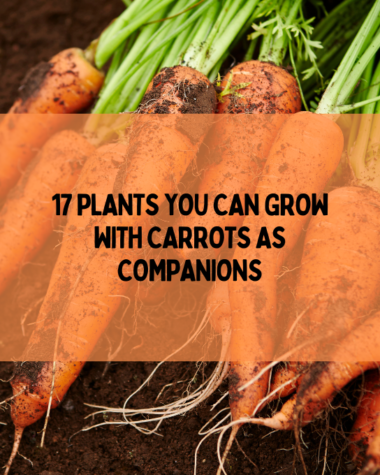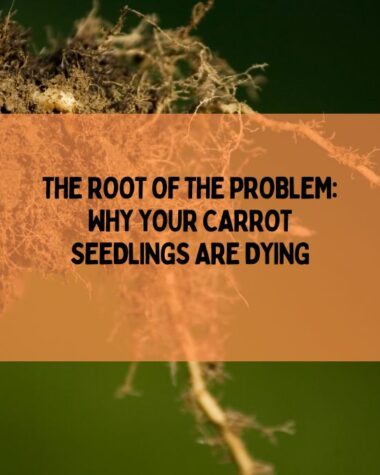Why do Carrots Crack? Carrots can crack or split due to several factors, including inconsistent watering or moisture levels, poor soil quality, temperature fluctuations, overcrowding of carrot plants, and improper harvesting techniques.
Carrots are a popular vegetable that can be enjoyed raw or cooked in various dishes. However, sometimes carrots can crack, which is frustrating for gardeners and farmers.
Cracking of Carrots occurs when the outer layer of the carrot dries out faster than the inner layer, causing the carrot to split or crack. This can happen due to uneven watering, soil conditions, or temperature fluctuations.
In this article, I will provide tips for preventing carrot cracking, including proper watering techniques, soil management, and harvest timing. By following these tips, you can help your carrots grow healthy.
Understanding Carrot Cracking

Carrot cracking refers to the phenomenon where the outer layer of a carrot dries out faster than the inner layer, leading to the splitting or cracking of the carrot. This can happen for several reasons, including inconsistent watering, poor soil conditions, temperature fluctuations, and rapid growth.
Carrot cracking has different types, including radial cracking, which occurs in a star-shaped pattern around the top of the carrot, and concentric cracking, which occurs in circles around the top of the carrot. Forked cracking can also occur when the carrot splits into two or more forks.
Related Read
- What Causes Holes In Cucumbers And How to Prevent It?
- What is bumpy zucchini? Why is my zucchini bumpy?
- Top 8 reasons why tomato plants are turning brown – How to fix them?
Factors that Contribute to Carrot Cracking

Carrot cracking can be caused by a variety of factors, including:
- Inconsistent watering and moisture levels: Carrots require consistent moisture levels to grow correctly. If they receive too much or too little water, the outer layer of the carrot can expand or contract too quickly, leading to cracking. It’s essential to water carrots regularly and consistently to prevent this from happening.
- Soil quality and preparation: Carrots grow best in loose, well-draining soil. If the soil is too complicated or compact, it can prevent the carrot from growing evenly, leading to cracking. Proper soil preparation, including loosening the soil and adding organic matter, can help prevent carrot cracking.
- Temperature fluctuations: Carrots are sensitive to rapid changes in temperature. If the temperature fluctuates too quickly, it can cause the carrot to expand and contract too quickly, leading to cracks. Maintaining a consistent temperature in the growing environment is essential to prevent this.
- Overcrowding of carrot plants: Carrots need space to grow properly. If they are overcrowded, they may grow unevenly, leading to cracking. It’s important to space carrot plants properly and thin them out as necessary to prevent overcrowding.
- Improper harvesting techniques: Harvesting carrots at the wrong time or using improper techniques can also lead to cracking. Harvesting carrots when fully mature and using a digging fork or spade to gently lift them out of the ground to avoid damaging them.
Tips for Preventing Carrot Cracking
Here are some tips for preventing carrot cracking:
- Proper watering and irrigation techniques: Water carrots regularly and consistently to prevent uneven moisture levels that can lead to cracking. Avoid overwatering and allow the soil to dry out slightly between waterings.
- Soil quality and preparation tips: Plant carrots in loose, well-draining soil that has been amended with compost or other organic matter. Avoid too hard or compact soil, preventing carrots from growing evenly.
- Temperature regulation methods: Maintain a consistent temperature in the growing environment using shade cloth or row covers to protect carrots from extreme heat or cold. Avoid planting carrots in areas that are prone to rapid temperature fluctuations.
- Plant spacing and thinning recommendations: Space carrot plants properly to allow for even growth and prevent overcrowding. Thin carrots as necessary to ensure that they have enough space to grow.
- Harvesting techniques for avoiding carrot cracking: Harvest carrots when fully mature and the soil is dry. Use a digging fork or spade to gently lift them out of the ground, careful not to damage them—store carrots in a cool, dry place to prevent them from drying out or becoming too moist.
Following these tips, you can help ensure your carrots grow healthy and robust without any unsightly cracks or splits.
Also, Read
- Preventing The Spread Of Root-Knot Nematodes To Save Carrot Crops
- The Root Of The Problem: Why Your Carrot Seedlings Are Dying
- What To Do About Powdery Mildew On Carrot Crops?
Common Myths about Carrot Cracking
There are several common myths about carrot cracking that are only partially accurate. Here are a few of them, along with their refutations:
- Myth: Carrots only crack due to lack of water.
Refutation: While inconsistent watering or lack of moisture can contribute to carrot cracking, it is not the only factor. Overwatering or rapid temperature changes can also cause cracking.
- Myth: Carrots crack because they are too old.
Refutation: Carrots can crack at any age, depending on the growing conditions. While older carrots may be more prone to cracking, it is not guaranteed.
- Myth: Only certain types of carrots are prone to cracking.
Refutation: Carrot cracking can happen to any variety of carrots. While some types may be more prone to cracking due to their size or shape, it is not exclusive to any specific type.
- Myth: There is nothing you can do to prevent carrot cracking.
Refutation: There are several steps you can take to prevent carrot cracking, including proper watering, soil preparation, temperature regulation, plant spacing, and harvesting techniques.
Understanding the true causes of carrot cracking and taking steps to prevent it from happening is essential. By debunking these common myths, you can better understand how to care for your carrots and grow healthy, crack-free crops.
Conclusion
In conclusion, carrot cracking can be a frustrating problem for gardeners, but it can be prevented by taking several key steps. Proper watering, soil preparation, temperature regulation, plant spacing, and harvesting techniques can help your carrots grow healthy and robust without unsightly cracks or splits.
It’s also important to debunk common myths about carrot cracking, such as the belief that carrots only crack and split due to lack of water or that you can do nothing to prevent it. By understanding the true causes of carrot cracking and following these tips, you can enjoy a bountiful harvest of healthy, delicious carrots.
Happy Gardening!







